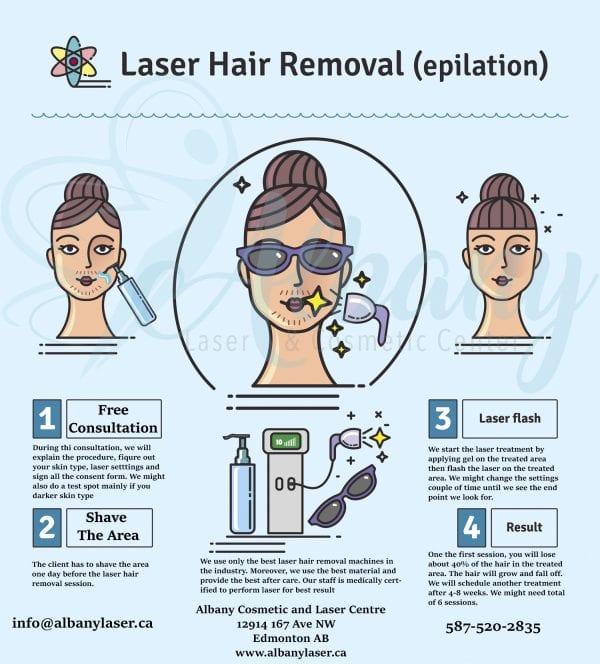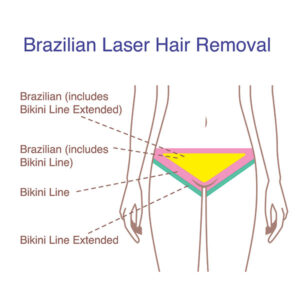
Navigate the Treatment Details
How does laser target unwanted hair?

Laser hair removal works by targeting individual hair follicles with a laser beam, delivering a concentrated beam of light that is selectively absorbed by the pigments in the hair. This light energy then converts to heat and destroys the hair follicle, stopping further growth. It’s an incredibly precise procedure, able to deliver maximum results with minimal discomfort and no damage to the surrounding skin – great news for those seeking to remove unwanted body and facial hair! Laser hair removal also has many advantages over traditional methods like waxing or shaving, as it saves time and can be done more effectively in fewer sessions. Plus, it’s a great way to get rid of stubborn hairs without damaging your skin in any way. No wonder it’s becoming increasingly popular!
Client Reviews and Testimonials
Jessica M.
Read More
I recently had Botox treatment at Albany Clinic for my frown. I'm really happy with the results. Moreover, the staff was friendly and professional, making me feel at ease throughout the procedure. They use freezing cream and leave it long enough to work. So I highly recommend them!
Samah S.
Read More
"I'm very happy with the results of the laser hair removal at Albany Centre. The procedure was quick and comfortable. I did not feel rushed and provided me with many towels to change. So, I recommend them to anyone.
Olivia A.
Read More
"I had an excellent experience with Albany Centre for lip fillers. Moreover, the team was so welcoming, and the results were just what I wanted. My lips look natural but bigger and with a heart in the middle!"
Previous
Next
Laser Hair Removal FAQs
Does Laser Hair Removal Effective For Everyone?
While laser hair removal can be an effective way to remove unwanted hair for most people. However, it’s important to remember that it may not be suitable for all types of hair. Laser treatments focus on targeting darker pigments in the skin, meaning they tend to work best on darker-coloured hairs. People with light or red-coloured hair may not have as much success with laser treatment as those with dark hair. Additionally, laser treatments are more effective on people with fair skin tones, as those with darker skin tones may experience reduced results due to increased pigment in the skin. It’s best to talk to a specialist before deciding if laser treatments are right for you and your particular type of hair so you can make an informed decision.
Are laser hair removal results permanent?
The result is long-lasting hair reduction in the treatment area, though it often requires multiple sessions to achieve desired results. Laser hair removal works best on people with light skin and dark, coarse hair, as these types of hair absorb more laser energy. While it can be an effective way to reduce or eliminate unwanted body hair, it cannot permanently remove all types of hair or prevent future growth entirely.
Is laser Treatment Safe?
It’s a question many people ask when considering this treatment for their unwanted body and facial hair. The short answer is yes – laser hair removal is typically safe when done correctly by a qualified professional. But, like most medical procedures, there are risks and considerations that must be made to ensure the best possible outcome. Laser hair removal works by targeting the melanin in the hair follicles with bursts of highly concentrated light, which can cause discomfort or skin discoloration if not performed correctly. To reduce the risk of any potential side effects and ensure results,
it’s important to choose an experienced provider who uses quality technology such as Health-Canada-cleared lasers. Additionally, it’s essential to follow all pre-treatment and post-care instructions provided by your practitioner, including avoiding direct sun exposure for several days before and after treatments. With high-quality technology and advanced techniques used by skilled practitioners, you can rest assured that laser hair removal is both safe and effective for removing unwanted body and facial hair permanently.
I heard some people offer cheap laser hair removal services from their homes. Can I trust them?
Going to someone running a laser hair removal from their home may not be the best idea. While it may seem tempting to take advantage of a cheaper procedure, there are potential risks to consider.Sure, she might have been properly trained and certified, but there is no guarantee that any regulatory body will approve her machine or that she has enough experience or insurance. Additionally, performing this procedure in an uncontrolled environment can make it difficult to maintain proper safety standards. It’s important to consider all factors before deciding if you can trust someone with such a delicate procedure.
Why does it take multiple sessions for Medical laser hair removal?
Medical Laser hair removal is most effective when a hair follicle is at a specific growth stage (anagen). Usually, hair follicles are at three different growth stages. Depending on the body part, it might take a hair follicle a couple of weeks or months to go through the whole growth stages. We must hit the hair with the laser beam at the anagen stage. One session will terminate most of the hair at that stage; then, we have to wait for the hair that survives the first session to grow to that stage before we hit it with a laser again. There is no way for us to know what stage a hair follicle is at. We can target as much hair as possible by adjusting the setting and spot size.
Are people with Blond, red, or grey hair good candidates for Medical Laser hair removal?
No, grey hair has no melanin. Pheomelanin found in red and blonde hair is poorly absorbed by laser.








